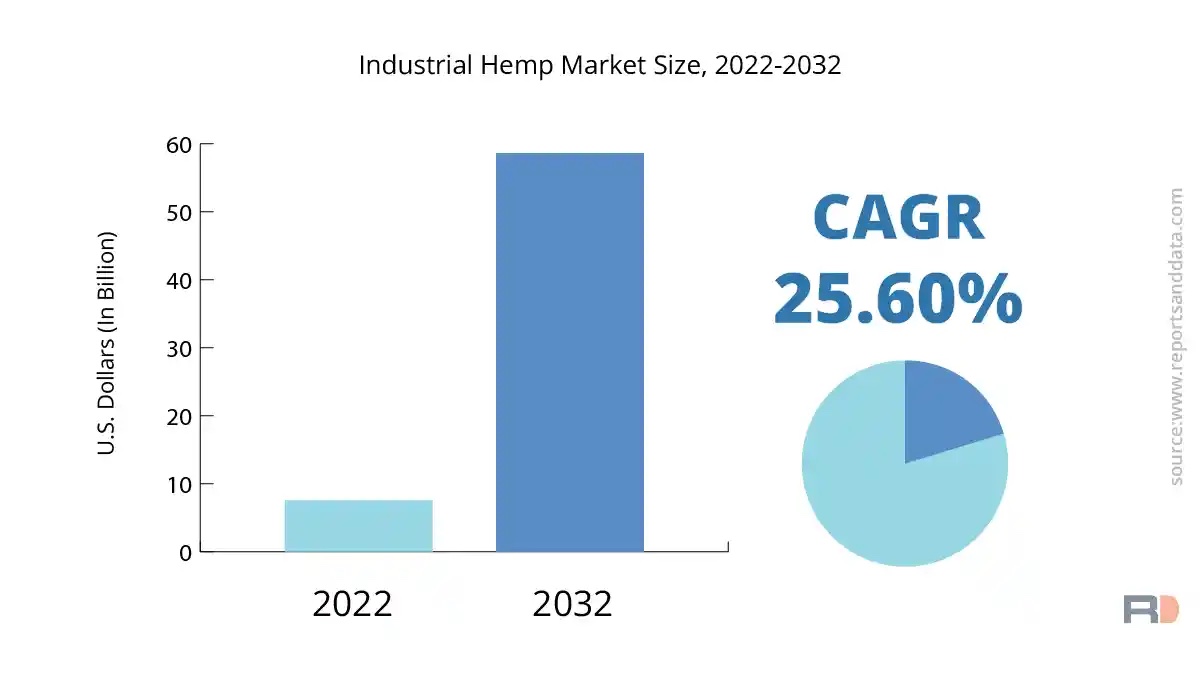Market Synopsis
The global industrial hemp market size was USD 7.54 billion in 2022 and is expected to reach a value ofUSD 58.62 billion in 2032 and register a revenue CAGR of 25.6% during the forecast period. The growing demand for hemp-based products across a variety of industries, including food and beverage, textiles, construction, and healthcare, is one of the main drivers of market revenue growth. Market revenue growth is being driven by the legalization of industrial hemp farming in several nations as well as growing consumer knowledge of the advantages of products made from hemp.
Hemp is a flexible plant that may be used to produce a variety of goods, including textiles, building materials, Cosmetics, food, and beverages, as well as health supplements. The demand for hemp-based products, which is predicted to fuel the market revenue growth in the upcoming years, is being driven by the rising popularity of plant-based products and the trend towards sustainable and eco-friendly products.

The rising demand for foods and beverages made from hemp is one of the main factors driving the industrial hemp market. Because hemp seeds are an abundant source of protein, omega-3 and omega-6 fatty acids, and other necessary elements, a variety of hemp-based food and beverage products have been created. The demand for food products made from hemp is increasing due to the rising acceptance of vegan and plant-based diets, which is expected to drive market revenue growth in the next years.
The market for industrial hemp is fueled by the rising demand for hemp-based textiles in addition to foods and beverages. Hemp fiberfibers are an excellent substitute for cotton and other traditional textiles since they are strong, long-lasting, and environmentally friendly. The demand for hemp-based textiles is being driven by the growing emphasis on sustainability and the need to lessen the environmental effect of textile production, which is expected to fuel market revenue growth in the upcoming years.
Also, the expansion of the market’s income is being stimulated by the usage of hemp in construction materials. Construction materials made of hemp, such hempcrete, are lightweight, permeable, and have superior insulating qualities. The need for hemp-based construction materials is being driven by the rising demand for environmentally friendly and sustainable building materials, which is expected to fuel market revenue growth in the upcoming years.
The market for industrial hemp is also being propelled by the rise in popularity of hemp-based medical products. Products made from hemp, like CBD oil, are thought to provide a variety of health advantages, such as the ability to reduce inflammation and relieve pain and anxiety. The rising demand for hemp-based healthcare goods is likely to fuel market revenue growth in the upcoming years due to rising awareness of the health advantages of hemp-based products and the expanding popularity of natural and alternative medicine.
Also, the legalization of industrial hemp farming in several nations is fueling the expansion of market revenues. The legalization of industrial hemp farming has created new markets for farmers and enterprises, which is expected to fuel market revenue growth in the years to come.
The market for industrial hemp, however, also confronts difficulties like regulatory problems, a lack of standardization, and a lack of consumer understanding of the advantages of hemp-based goods. Regulations governing the production, processing, and distribution of industrial hemp products differ from nation to nation, which can present difficulties for companies competing in the market.
Full Report here – Industrial Hemp Market Report
